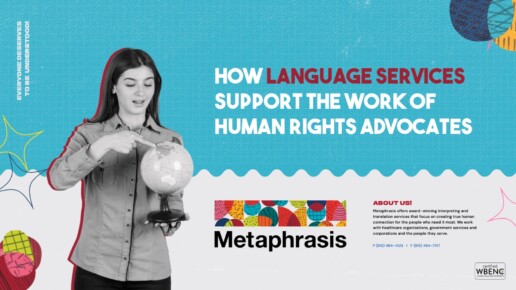How Language Services Support the Work of Human Rights Advocates
In a world where human rights violations know no borders, the ability to communicate across languages is not just helpful—it’s essential. Human rights advocates work tirelessly across diverse communities, often navigating complex cultural and linguistic landscapes. This is where professional language services, like those offered by Metaphrasis, step in to bridge the gap. From real-time interpretation in refugee interviews to precise document translation for legal proceedings, language support plays a pivotal role in advancing justice, equality, and advocacy.
Why Language Access Matters in Human Rights Work
At the heart of human rights advocacy is the mission to protect and empower individuals—regardless of their language, ethnicity, or background. But when language barriers exist, the message of justice can be lost in translation. Survivors of abuse, asylum seekers, and marginalized communities often cannot express their stories or needs effectively without language assistance.
Without accurate interpretation or translation:
- Legal testimonies can be misunderstood.
- Critical medical or psychological evaluations may be compromised.
- Victims might feel further alienated, leading to distrust and trauma.
That’s why professional language access is more than just communication—it’s a form of equity and inclusion.
How Metaphrasis Elevates Advocacy Through Language Services
Metaphrasis, a leading language services provider, has long supported nonprofits, government agencies, and human rights organizations in breaking down linguistic barriers. Here’s how they’re making an impact:
Professional Interpretation for Critical Situations
In emergency shelters, legal clinics, and medical evaluations, interpreters are often the frontline bridge between advocates and the people they serve. Metaphrasis offers on-site interpretation, telephone interpretation, and video remote interpretation, ensuring timely and culturally competent communication. These interpreters are trained in trauma-informed practices, which is essential when working with vulnerable populations.
Accurate Document Translation for Legal and Humanitarian Work
Human rights cases often involve crucial documents—witness statements, immigration forms, court filings—that must be translated with precision. A mistranslation can derail a case. Metaphrasis ensures every document is handled by certified translators with legal and human rights expertise, preserving the accuracy and integrity of each word.
Cultural Competency as a Core Value
Beyond literal translation, effective advocacy requires cultural sensitivity. Metaphrasis integrates cultural intelligence into all services, training their linguists to understand context, idioms, and regional differences. This ensures messages are not just translated, but truly understood.
The Legal and Ethical Side of Language Access
Under laws like Title VI of the Civil Rights Act and Executive Order 13166, organizations receiving federal funding must provide meaningful language access. In human rights work, this is not just a regulation—it’s a moral imperative. Miscommunication can lead to wrongful deportations, unfair convictions, or denied healthcare. Metaphrasis helps ensure compliance while centering dignity and fairness.
Benefits of Partnering with a Language Services Provider
- Consistency and Reliability: Whether it’s scheduled for last-minute, Metaphrasis ensures prompt access to professional interpreters and translators.
- Scalability: From one-time cases to long-term partnerships, their services grow with your mission.
- Quality Assurance: With rigorous vetting and continuous training, Metaphrasis maintains high standards across languages and contexts.
Language Equity as a Pillar of Human Rights
Language is power. When human rights advocates equip themselves with the tools to communicate across barriers, they amplify marginalized voices and ensure justice is not just an ideal, but a lived experience. Metaphrasis doesn’t just translate words—they translate hope, justice, and change.
Conclusion
In the ongoing pursuit of global justice, language services Chicago are not an afterthought—they are foundational. Through interpretation, translation, and cultural expertise, Metaphrasis supports the unsung heroes of human rights: the advocates on the ground. Whether it’s helping a refugee tell their story, assisting a survivor in court, or translating critical policies for community access, language is the bridge to human dignity—and Metaphrasis is leading the way across it.

